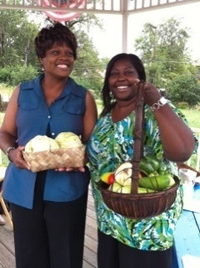The Presbyterian Committee on the Self-Development of People has approved grants totaling $261, 255 to 14 self-help projects in the United States.
The money is from the One Great Hour of Sharing offering.
Projects range from assisting low-income Hispanic women address poverty through a sewing program to a group of ex-offenders who have been trained in building construction and repair.
SDOP enables members and non-members of the Presbyterian Church (U.S.A.) to form partnerships with economically poor, oppressed and disadvantaged people in order to help them achieve self-sufficiency.
Grants were approved at SDOP’s national committee meeting in Biloxi, M.S., Jan. 20- 22.
The projects and grants:
- The Winning Circle, Chicago — $15,000 — This low-income group in attaining self-sufficiency in food sustainability, health, wellbeing, self-esteem and weight control through learning to compost. Excess produce will be sold helping group members to increase their income.
- Team Builders on Point Crew, Chicago — $18,950 — A group of ex-offenders have been trained in building construction, repair and maintenance. The project will enable group members to be self-employed and also receive training in business practices.
- Parents Helping Parents, Middletown, Ohio — $15,000 — This project makes transportation available to low-income families with children involved in after-school programs.
- Central Illinois Organizing Project, Bloomington, Ill. — $20,000 — The grant will enable this leadership development program to provide ongoing training and recruitment of leaders to advocate for social justice and equal rights of Latinos in the community.
- Care, Voice, Advocate, Lansing, Mich. — $20,000 to assist a group of ex-offenders and their families who advocate for changes in laws that discourage and inhibit ex-offenders from having successful transitions back into their communities.
- Reflect and Strengthen, Dorchester, Mass. — $20,000 — This is a grassroots collective of young working-class women from Boston urban neighborhoods who take a holistic approach to organizing to create personal and social transformation.
- Public Housing Leadership initiative (PHRN), Wethersfield, Conn. — $20,000 — These low-income tenants are supporting themselves in their struggle to preserve and improve public housing communities. They are protecting their rights by increasing the number of public housing leadership teams working to build democratic resident organizations while joining the statewide organization.
- Café Con Teatro Colao, Brooklyn, N.Y. — $15,000 to a group of local artists who will develop their craft and engage and exhibit their talent in this less affluent community.
- Bosque Rio Abajo Lodging Cooperative (RIOCOOP), Arecibo, Puerto Rico — $20,000 — This low-income community in Puerto Rico has a 21.5 percent unemployment rate. The grant will enable the group to renovate and repair a local building to be rented for conventions, retreats and ecotourism.
- Corcovada, Inc. Committee, Añasco, Puerto Rico — $18,915 — This isolated and poor community needs recreational space for youth, elders, families and community gatherings. The grant will enable the community to restore and equip a property with a space for trainings, orientations and other activities.
- Neighbors United Mobile Home Council, Miami — $20,000 — The council is an all-volunteer network of mobile home residents in Miami who advocate for protection against eviction due to the sale of their mobile home parks. They are also advocating for first-right to purchase the land should it be put up for sale.
- North Carolina International Justice Campaign, Raleigh, N.C., — $20,000 — This project combines community organizing among low wage public sector workers with education and legal action based on international human rights standards. The workers seek to challenge their discriminatory and unsafe conditions through collective bargaining, which is banned for public employees in North Carolina.
- Pine House Project, Colorado Springs, Colo. — $20,000 — This project involves renovating a house for men recovering from drug and alcohol addiction. The men in the home are using sweat equity to repair the home with the cooperation of a local developer.
- Knitting and Sewing Workshop, Pueblo, Colo. — $18,640 — These low-income Hispanic women are addressing poverty by teaching each other how to sew and selling the clothing at a modest price.
Committee members also visited an SDOP partner, South Plaquemines Parish United Fisheries Cooperative in Port Sulphur, LA. Adversely impacted by Hurricane Katrina and the recent Gulf Coast oil spill, this group of multi-racial/ethnic shrimpers, crabbers and fishermen have formed a cooperative as an economic tool for addressing their previous and existing systems of poverty, rebuilding the local fishing industry and restoring their communities and heritage.

